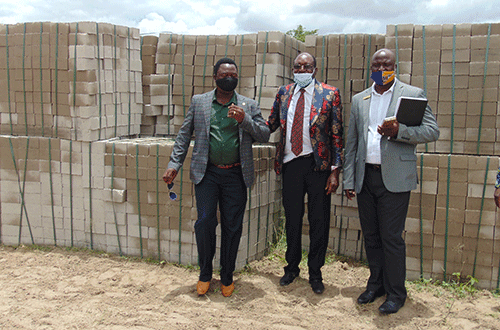Rauna Kalola
Erongo governor Neville Andre has applauded the Japanese embassy in Namibia as well as the World Health Organisation for their continued support towards healthcare in the country. Andre, who was speaking during a visit by the Japanese embassy and WHO delegation to the region, said support programmes, including improving reproductive health, maternal, child health services as well as efforts to mitigate the impact of Covid-19, have had a huge impact on the lives of Namibians.
“I am pleased to receive the support and commitment our region is getting through the international partners,” Andre said. He also said the procurement of a sonar machine by the Japanese government through WHO for the Kuisebmond health centre in Walvis Bay will benefit all expectant mothers.
“This means a lot to our people, as our people can now get access to this type of technology, something which only a few used to get access to, but now it will be expanded to more,” he said. The governor also commended the launch of the new antenatal guideline by the Ministry of Health and Social Services, which he said would give expectant mothers a positive pregnancy experience.
The new guideline includes shifting from four focus ANC (antenatal care) visits to eight ANC contact and mandatory ultrasound examination between 20-24 weeks of pregnancy. Deputy minister of health Ester Muinjangue said maternal health matters should be regarded as a human right.
“Maternal, perinatal and newborn health matter to every person, society and country and should be viewed from both a human rights and wellbeing perspective as highly important topics,” she said.
Furthermore, WHO representative Dr Sagoe-Moses said the Covid-19 pandemic continues to disrupt access to and utilisation of reproductive, maternal, and child health services. “Children, adolescents, and mothers are not getting the care they need as the pandemic has put health systems and the ability to deliver health services under extreme pressure,” he said. He further stated challenges to maintaining a balance between scaling up an effective Covid-19 response and ensuring continuity of health services have been experienced in all other countries and the WHO envisaged a world where every pregnant woman, a newborn receives quality care throughout the pregnancy, childbirth and post-natal period.
“To respond to the complex nature of reproductive, maternal, and newborn care services delivery that was disrupted by the pandemic, WHO through the generous financial support of over N$4 million from the government of Japan last year, supported the health ministry to strengthen and increase the uptake of reproductive, maternal, newborn, and child health services,” he said.
The collaboration benefited over 28 000 pregnant women and almost 150 000 children under the age of five and about 16 primary health facilities were equipped with portable ultrasound machines and other accessories to enable quality ANC services to improve maternal health services.
Japanese ambassador to Namibia Hideaki Harada applauded the collaboration and joint efforts between the two countries as it has led to a successful implementation of Japanese-funded projects and further confirmed that Japan will continue to support Namibia. “I would like to reiterate the continued commitment of the government of Japan in supporting priority health programmes for Namibia and sincerely hope our united efforts will benefit the people of Namibia,” he said.
Harada further said the government of Japan committed US$1.6 million for the procurement of cold chain equipment for Covid-19 vaccines and other related vaccines at health facilities in Namibia. “This support will be implemented through UNICEF and the embassy will further be committed to supporting Namibia’s endeavour to strengthen its healthcare system.”
The beneficiaries of the Kuisebmond health centre expressed gratitude and welcomed the improved maternal health service. Some indicated that the service has been brought closer to the community of Walvis Bay since ultrasound examination was only available at the Walvis Bay district hospital. Hilia Ndahutuka, a beneficiary said: “My experience with them has been a very good experience they are good nurses. Now we do not have to take a taxi to the state hospital which is far.”
Geneveva Birisamus, who is an expectant mother for the fourth time and never had an ultrasound examination for the last three pregnancies, also shared her experience. “I never used to go for sonar but now this is my second time receiving the service for my last pregnancy,” she said.


